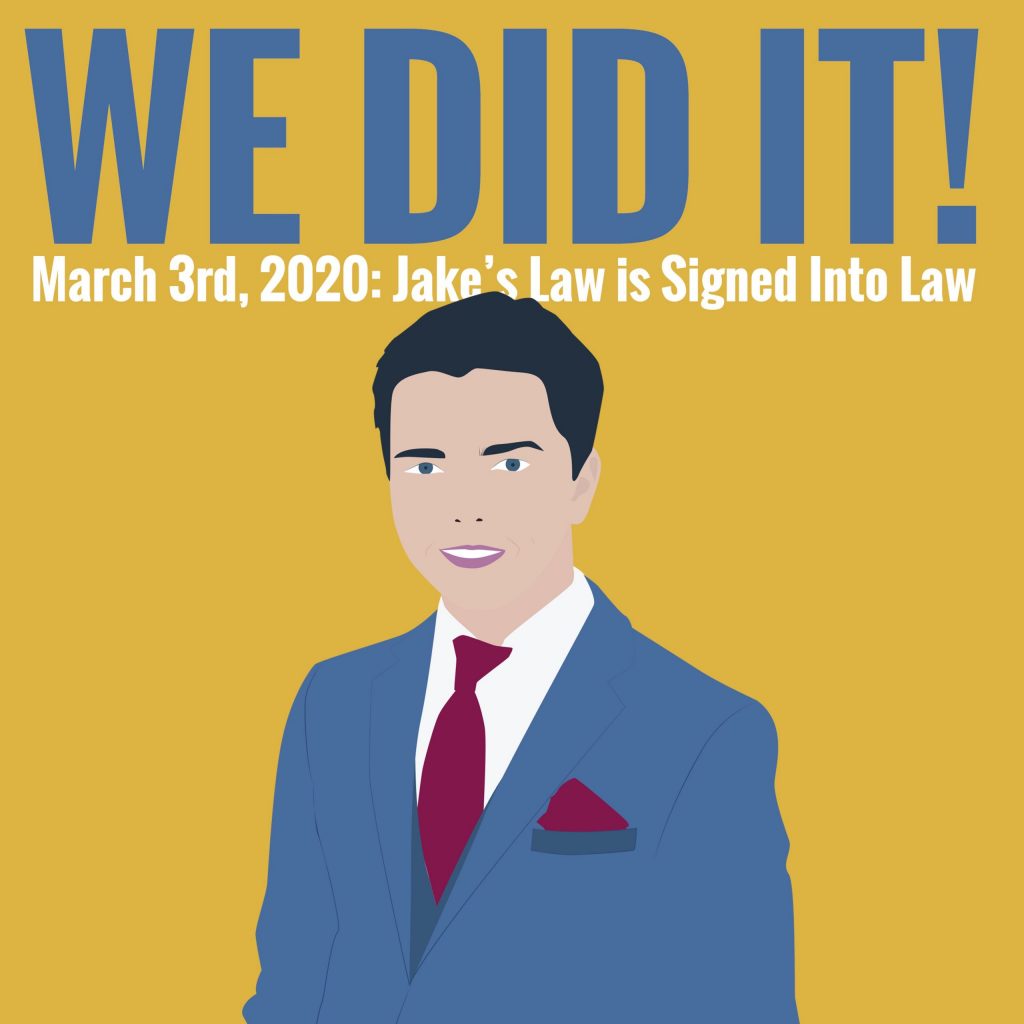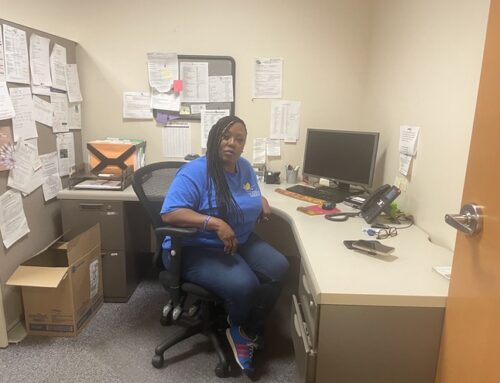It is hard to believe that it has been 4 years since Jake’s Law passed. Looking back, it feels like a lifetime ago while also feeling like yesterday. So much has happened. Did you know that the signing of Jake’s Law was the Governor’s last signing ceremony before COVID shut down the legislative session? Jake’s Law was one of only a few bills passed in 2020. If we had not run the bill as a mirror bill, meaning it ran in both the House and Senate simultaneously, it would never have been voted into law in 2020. The stars seemed to align, and on March 3, 2020, Governor Ducey signed it into law.
SB1523, a.k.a. Jake’s Law, passed unanimously in both the House and the Senate. This is just further proof that Republicans and Democrats can work together, and it shows us the power of what can be done if we come together for a common purpose. I firmly believe that we can move mountains by coming together.
We are often asked how we did it. How did we get legislation passed? I won’t lie; it was not easy; it took a lot of work, and we shared our experience day in and out for almost four years. This certainly took an emotional toll; however, it was worth it. Here we are now with successful legislation! Woot!
Looking back, I think of seven main areas that were the secret to the passage of SB1523.
Relationships
Knowledge of the problem
Offering solutions to the problem
Staying focused and being professional
Working with both sides of the aisle
Having a strong bill sponsor
Having a strong coalition
Relationships were critical. We met with anyone and everyone we could. We contacted local and national non-profits, legislators, churches, businesses, and individuals who shared a passion for behavioral health and asked them for meetings. During those meetings, we asked for contact information for other people/organizations aligned with our goal. Those relationships opened so many doors for us. Many of those connections helped educate us on the legislative process, and some of these people even became leaders in our insurance parity coalition. It is one of the main components of our success.
Knowledge of the problem. We knew that Jake’s suicide was a direct result of being denied care by the insurance company. We knew there was a problem, but we didn’t know precisely what that problem was. Through several meetings, educating ourselves, and meeting with people, we discovered that the issue was the lack of insurance parity, a subject we had never even heard of before. We became members of other coalitions, specifically The Kennedy Forum, national leaders advocating for insurance parity. We found out all that we could about insurance equality, and then we started offering classes and training to educate others about the subject and the issues surrounding it. We could take this knowledge to legislators and educate them as well. You would be surprised how many legislators didn’t know what parity was or that a federal parity law existed.
By educating ourselves on insurance parity, we could look at what other states and organizations were successfully doing. We shared that information in our meetings with legislators, discussing the problem and offering them solutions. We knew creating a state parity law would ensure that insurance companies doing business in Arizona must comply with the federal parity law. Even though the federal parity law has already been enacted, many states have to enact their own legislation due to a lack of enforcement. Therefore, we knew we would have greater success if we enforced it at the state level. In our meetings, we also offered additional solutions that ultimately became part of Jake’s Law. This helped lawmakers understand the situation, and they appreciated having some solutions.
In the beginning, many people told us we were crazy and that we were wasting our time. The naysayers said we would never get an insurance parity law passed in Arizona. Along the way, many people tried to divide our attention and even tried to get us to stop the legislation for a time. By staying focused, we were able to move forward. Had we listened to the naysayers, we would not be here today. It was also essential for us to remember that the legislation may pass later; it may be a several-year process. Jake’s Law took almost four years. Remember, there will always be people who don’t believe in your vision. If you do, and your vision is right, you can do it.
Being professional is also extremely important. You may have a different opinion from the people you are working with or lawmakers themselves. Still, by remaining professional and staying focused, you can come together on the issue. We sat across from the same insurance company that denied Jake care. It was extremely difficult working with that insurance company, but by remaining professional and keeping our eye on the prize, Jake’s Law, we could get the legislation passed. Was it easy? Of course not, but was it worth it? Absolutely.
Refrain from falling into the trap of believing you only need to work with one side of the political aisle. You will need both Democrats and Republicans to pass legislation. It helped us once we realized that our legislators are just like us. They care about their communities and want to do what is best for them. Understanding that helped us during our meetings, even when we sometimes disagreed.
Having a strong bill sponsor is absolutely necessary. You need a bill sponsor that has succeeded in the past and works well with both sides. Had we had a weak bill sponsor, I don’t believe SB1523 would have passed. Meet with other legislators and organizations and ask who they think is a strong bill sponsor who can help you get your legislation across the finish line. They will tell you.
I can tell you unequivocally that we would not have been successful if we had not had our coalition. We did not do this alone. We had a fantastic group on our team that fought with us. When you’re building your coalition, find people passionate about your legislation and people who are willing to work. Many people said they were interested in helping us but never did. It takes work and dedication; you need people willing to dig in and get in the dirt with you. Create a mission statement to help you stay on target, and if things start coming up in the legislation that you are not sure about, go back to your mission statement and see how it aligns. If it doesn’t align with your mission statement, remove it.
Also, set up ground rules when you meet. It is easy to get off-topic and allow personal opinions to get in the way. Setting clear ground rules you all develop and agree to together can help avoid some of those pitfalls. The legislation does not happen in a vacuum; you will need your coalition. Assign duties to each member of the coalition. Who is going to help educate? Who will draft or help with the legislation? Who will help with social media? Who will share their personal stories? Who will help with community engagement by emailing and meeting with lawmakers on behalf of the legislation? Who is going to lobby legislators? If you know individuals who have relationships with specific legislators, assign them to meet with that lawmaker. There are many moving pieces when it comes to legislation.
Another component of the coalition is going to be personal stories. You must have people affected by whatever you are trying to change. You and they must testify in front of the Senate and the House. Please make sure you have people that are willing to share their stories. Personal stories, along with good legislation, are what sway legislators.
There are many moving parts regarding legislation, and you will need dedicated people to help you. It seems overwhelming, but you can pass legislation if you are dedicated. Ben and I are ordinary people who had never passed a bill and didn’t know the steps to pass a bill outside of what we learned in high school and School House Rock. We just knew there was a problem, and we knew we had to fix it before other families had to endure the loss of a loved one to suicide. No parent should have to bury a child. We were dedicated to making change happen and found others committed to that change. If we can do it, anyone can do it. So, what are you waiting for?
To learn more about Jake’s Law, visit our Jake’s Law page
To learn more about insurance parity, you can visit Insurance Parity or The Kennedy Forum





Leave A Comment